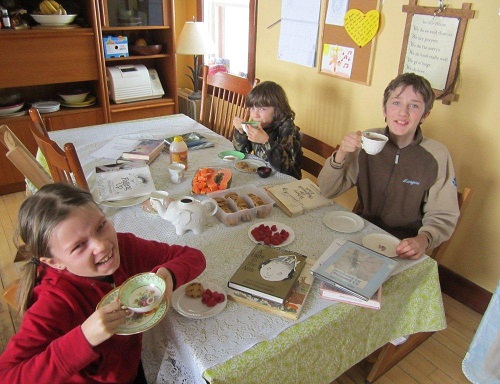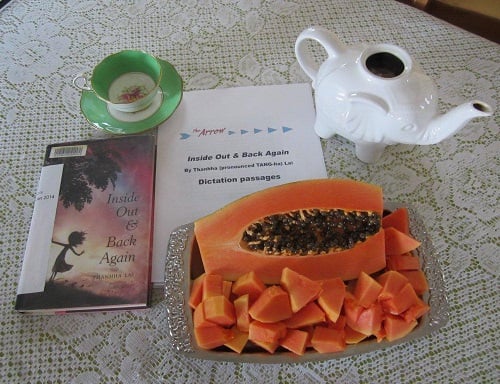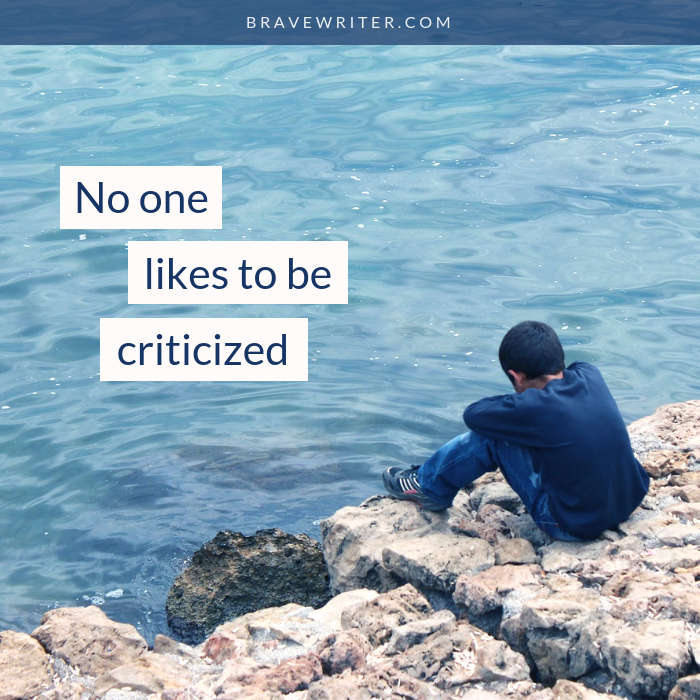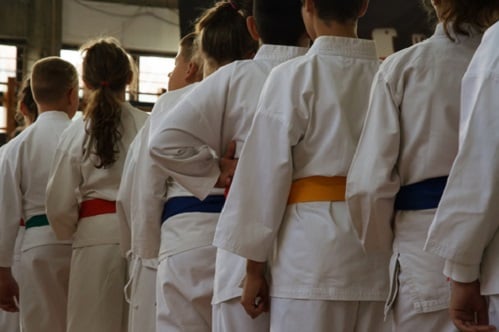The “resort on a beach” of all curricula is the “Open and Go” variety. You receive the UPS box in the mail, crack the spine of the new workbook or text, and immediately know what to do, right now, with your kids, without any preparation, reading of instructions, or adoption of a particular philosophy.
This magical product teaches the tough subject you have avoided without taxing you, plus your kids like it! What a bargain!
So do these products work for writing? More specifically, does Brave Writer have a product like this? Please, Mother may I?
Writing is unlike content-oriented subject matter. You aren’t exposing your children to a list of facts or details and asking them to memorize or consume them. Writing isn’t a set of formulae that needs to be introduced and practiced. Writing isn’t the coordination of handwriting, punctuation, spelling and grammar that can be learned, at times, in workbook formats. Writing is more than any of these, even if at times it embodies all of them.
Writing—original writing—is created from thoughts. Thoughts are personal to the writer. Thoughts come first. Everything else is window-dressing.
Just as speech required a context for risk and communication with an active partner, so, too, writing requires a witness and compassionate reader. Writing thrives when it becomes a dialog between the author and his or her audience—particularly the audience of an invested parent.
Scripting that dialog is not possible. A set of workbook pages doesn’t get at the mind life of the child. Writing forms don’t instruct a child in the process of self-inquiry (which is the genesis of all good writing). Handing a child a set of instructions to be read alone, and lines on the page to fill in, doesn’t help a child imagine herself as a writer. Rather the child is being taught that writing is external to self, done for that page, according to someone else’s ideas of what should go there.
Literally—open and go workbook writing programs ask children to think of writing as a task done according to someone else’s prescription of what goes “over there” away from self. Children are taught to think that the thoughts for writing exist inside someone else’s vision, and their job is to hunt them down (pluck them from the thin air) and hope they’ve collected enough of them in one place to get a “good grade.”
This is not writing. This is puzzle solving—holding the directions in the mind, while wrestling language into the imagined form the assignment creator may have intended.
Yet this “assignment writing in a workbook” is the holy grail of writing instruction! Can’t parents hand a book to their children and ask them to follow the clear instructions? Won’t writing grow with practice? What about all those writing assignments in high school and college? Kids don’t get to pick their topics or formats then, do they? Why not practice now?
Parents, typically, don’t have good memories of writing instruction from their childhoods, and many are not self-confident writers today. Yet many programs expect parents to instruct children in writing using similar methods that didn’t work all that well for them. These programs lead to similar results—mediocre, unsure writing. That’s not to say that some kids don’t find their way to brilliance and enthusiasm! Writers (kids who love writing) find their way regardless of method, half the time.
Helpful writing instruction requires a philosophy that is a paradigm shift away from how you, the parent, likely learned to write. The shift is in focus—away from form and accuracy as primary, and toward risk and expression as essential. Original writing is about how the mind generates thought—instruction is about how you foster an environment for creative thinking and language use to grow. It’s about recognizing that writing is more than words on a page, but is, rather, the valuing of the writer’s own perspective of the world—a writer’s personal experiences and values, curiosities, mastery of facts, passionate reads, hopes and aspirations, confusions and frustrations, challenges and arguments, connection to others, and reporting of information.
THIS is writing. All writing is this—this distillation of an individual’s mind life/thought world. Clarity and accuracy matter, but so do inspiration, imagination, critical thinking, and flexible, expanded vocabulary. Form helps to manage these aspects of the topic for writing, but forms can also stifle original thought. Knowing how to write means knowing how to manage the forms, rather than be managed by them.
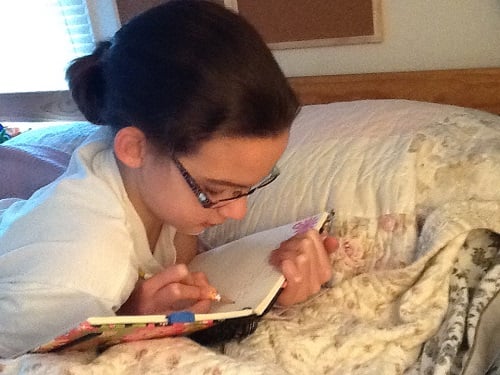 Image by Brave Writer mom, Sandy
Image by Brave Writer mom, Sandy
All this to say: “open and go” deprives writing of its essential context—space and room to explore. Can you imagine asking for an “open and go” parenting manual? “Open and go” driver’s training? “Open and go” sexuality and reproduction workbook?
When we are dealing with danger, complexity, values, intimate relationships, connection, or thought lives, we do our children a disservice to think we can teach them by opting out of the hard work of engaging with them. True partnership and dialog go more slowly, but so much more richly.
Brave Writer has materials and classes that support the relationship of new-writer to parent-coach. We even give you specific words to say, and processes and practices to try together. There are tools that can be used again and again as your young writers learn to internalize the self-inquiry style of writing generation. We give you projects to test together—with week by week instructions of what to do. But in each case, all the way until high school, your presence—your appreciation for and understanding of the process, your conversation and modeling—is essential.
Make time and space for writing in your family. It can look like teatime and poetry on some days. It can look like family movie night or read aloud time or freewriting or riddle-creating or limerick reciting. It may be the hard work of jotting down an endless story or the wise support you offer a teen trying to start a blog about recycling. Writing instruction might include the hard work of grammar study or learning to edit for spelling errors. But it isn’t essentially that. It is the discovery of what one has to say that is worth preserving and presenting in a cogent manner.
Writing is unlike any other subject in homeschool. In fact, —not a subject. Writing is about writers. Writers need readers. You are the reader—the partner, coach, and ally your child deserves, as you help your writers discover their voices, their vocabularies, and their powers of refining their messages in the written word.
No “open and go” workbook can show you how to do that. You need to live it alongside your kids, once you’ve adopted the principles into your heart. It’s a privilege to be that person in your child’s life. Don’t delegate it to a workbook! Yes it takes time. So do all the things you care most about.
Surprisingly, teaching writing this way is so pleasurable when you get there, it doesn’t feel like work any more. It feels like relationship. A good, rich one. The kind you want with your kids—the kind that lets you into their minds and hearts.
So worth it.
Image of open box © Sinisa Botas | Dreamstime.com



